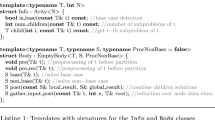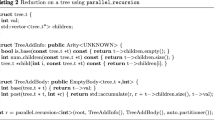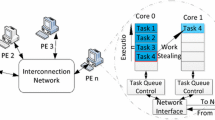Abstract
Divide-and-conquer is one of the most important patterns of parallelism, being applicable to a large variety of problems. In addition, the most powerful parallel systems available nowadays are computer clusters composed of distributed-memory nodes that contain an increasing number of cores that share a common memory. The optimal exploitation of these systems often requires resorting to a hybrid model that mimics the underlying hardware by combining a distributed and a shared memory parallel programming model. This results in longer development times and increased maintenance costs. In this paper we present a very general skeleton library that allows to parallelize any divide-and-conquer problem in hybrid distributed-shared memory systems with little effort while providing much flexibility and good performance. Our proposal combines a message-passing paradigm at the process level and a threaded model inside each process, hiding the related complexity from the user. The evaluation shows that this skeleton provides performance comparable, and often better than that of manually optimized codes while requiring considerably less effort when parallelizing applications on multi-core clusters.













Similar content being viewed by others
Notes
One might think that in 2016 every major compiler distribution should support OpenMP, but as a representative example, during the development of this work we found that the compilers of the standard development environment for the current version of Mac OS X do not support OpenMP.
References
Aho, A.V., Hopcroft, J.E., Ullman, J.D.: The Design and Analysis of Computer Algorithms. Addison-Wesley, Reading, MA (1974)
Aldinucci, M., Danelutto, M., Teti, P.: An advanced environment supporting structured parallel programming in Java. Future Gener. Comput. Syst. 19(5), 611–626 (2003)
Barnes, J., Hut, P.: A hierarchical O (N log N) force-calculation algorithm. Nature 324(4), 446–559 (1986)
Bientinesi, P., Gunnels, J.A., Myers, M.E., Quintana- Ortí, E.S., van de Geijn, R.A.: The science of deriving dense linear algebra algorithms. ACM Trans. Math. Softw. 31(1), 1–26 (2005)
Blumofe, R.D., Joerg, C.F., Kuszmaul, B.C., Leiserson, C.E., Randall, K.H., Zhou, Y.: Cilk: an efficient multithreaded runtime system. J Parallel Distrib. Comput. 37(1), 55–69 (1996)
Boost.org. Boost C++ libraries. http://boost.org (2016). Accessed 10 Dec 2016
Ciechanowicz, P., Kuchen, H.: Enhancing Muesli’s data parallel skeletons for multi-core computer architectures. In 12th IEEE International Conference on High Performance Computing and Communications, (HPCC 2010), pp. 108–113. Los Alamitos, CA (2010)
Cole, M.: Algorithmic Skeletons: Structured Management of Parallel Computation. MIT Press, Cambridge, MA (1989)
Cole, M.: Bringing skeletons out of the closet: a pragmatic manifesto for skeletal parallel programming. Parallel Comput. 30(3), 389–406 (2004)
Danelutto, M., De Matteis, T., Mencagli, G., Torquati, M.: A divide-and-conquer parallel pattern implementation for multicores. In Proceedings 3rd International Workshop on Software Engineering for Parallel Systems, SEPS 2016, pp. 10–19. New York, NY (2016). ACM
Dean, J., Ghemawat, S.: Mapreduce: simplified data processing on large clusters. Commun. ACM 51(1), 107–113 (2008)
Denis, A.: pioman: A pthread-based multithreaded communication engine. In Proceedings of 23rd Euromicro International Conference on Parallel, Distributed and Network-Based Processing (PDP 2015), pp. 155–162. Los Alamitos, CA (2015)
Falcou, J., Sérot, J., Chateau, T., Lapresté, J.-T.: Quaff: efficient C++ design for parallel skeletons. Parallel Comput. 32(7–8), 604–615 (2006)
Fleming, P.J., Wallace, J.J.: How not to lie with statistics: the correct way to summarize benchmark results. Commun. ACM 29(3), 218–221 (1986)
Frigo, M., Leiserson, C.E., Prokop, H., Ramachandran, S.: Cache-oblivious algorithms. In Proceeding of 40th Annual Symposium on Foundations of Computer Science, FOCS ’99, pp. 285–297. Washington, DC, USA. IEEE Computer Society (1999)
González, C.H., Fraguela, B.B.: A generic algorithm template for divide-and-conquer in multicore systems. In Proceedings of 12th IEEE International Conference on High Performance Computing and Communications, (HPCC 2010), pp. 79–88. Los Alamitos, CA (2010)
González, C.H., Fraguela, B.B.: A framework for argument-based task synchronization with automatic detection of dependencies. Parallel Comput. 39(9), 475–489 (2013)
González, C.H., Fraguela, B.B.: An algorithm template for domain-based parallel irregular algorithms. Int. J. Parallel Program. 42(6), 948–967 (2014)
Gorlatch, S., Cole, M.: Parallel skeletons. Encyclopedia of Parallel Computing, pp. 1417–1422. Springer, New York (2011)
Gregor, D., Troyer, M.: Boost.MPI. http://boost.cowic.de/rc/pdf/mpi.pdf (2007)
Halstead, M.H.: Elements of Software Science. Elsevier, New York, NY (1977)
Hijma, P., Jacobs, C.J.H., van Nieuwpoort, R.V., Bal, H.E.: Cashmere: Heterogeneous many-core computing. In 29th IEEE International Parallel and Distributed Processing Symposium (IPDPS 2015), pp. 135–145 (2015)
Horowitz, E., Zorat, A.: Divide-and-conquer for parallel processing. IEEE Trans. Comput. 32(6), 582–585 (1983)
Intel\(\textregistered \). Cilk\(^{\text{TM}}\) Plus. https://www.cilkplus.org (2016). Accessed 10 Dec 2016
Karasawa, Y., Iwasaki, H.: A parallel skeleton library for multi-core clusters. In Proceedings of 2009 International Conference on Parallel Processing (ICPP’09), pp. 84–91. Los Alamitos, CA (2009)
Kawakatsu, T., Kinoshita, A., Takasu, A., Adachi, J.: Divide-and-Conquer Parallelism for Learning Mixture Models, pp. 23–47. Springer, Berlin (2016)
Kuchen, H.: A skeleton library. Euro-Par 2002 Parallel Processing. Volume 2400 of Lecture Notes in Computer Science, pp. 620–629. Springer, Berlin (2002)
Kulkarni, M., Burtscher, M., Cascaval, C., Pingali, K.: Lonestar: A suite of parallel irregular programs. In 2009 IEEE International Symposium on Performance Analysis of Systems and Software, pp. 65–76 (2009)
Leyton, M., Piquer, J. M.: Skandium: Multi-core programming with algorithmic skeletons. In Proceedings of 18th Euromicro Conference on Parallel, Distributed and Network-based Processing (PDP 2010), pp. 289–296. Los Alamitos, CA (2010)
Lima, J.V.F., Broquedis, F., Gautier, T., Raffin, B.: Preliminary experiments with xKaapi on Intel Xeon Phi coprocessor. In Proceedings of 25th International Symposium on Computer Architecture and High Performance Computing (SBAC-PAD 2013), pp. 105–112. Los Alamitos, CA (2013)
Mallón, D.A., Taboada, G.L., Teijeiro, C., Touriño, J., Fraguela, B.B., Gómez-Tato, A., Doallo, R., Carlos Mouriño, J.: Performance evaluation of MPI, UPC and OpenMP on multicore architectures. In Recent Advances in Parallel Virtual Machine and Message Passing Interface, 16th European PVM/MPI Users’ Group Meeting, pp. 174–184. Springer, Berlin (2009)
Mattson, T., Sanders, B., Massingill, B.: Patterns for Parallel Programming. Addison-Wesley Professional, Boston, MA (2004)
McCabe, T.J.: A complexity measure. IEEE Trans. Softw. Eng. 2, 308–320 (1976)
Nakatsukasa, Y., Higham, N .J.: Stable and efficient spectral divide and conquer algorithms for the symmetric eigenvalue decomposition and the SVD. SIAM J. Sci. Comput. 35(3), A1325–A1349 (2013)
National Aeronautics and Space Administration. NAS Parallel Benchmarks. http://www.nas.nasa.gov/Software/NPB/ (2010). Accessed 10 Dec 2016
Olivier, S.L., Prins, J.F.: Comparison of OpenMP 3.0 and other task parallel frameworks on unbalanced task graphs. Int. J. Parallel Program. 38(5–6), 341–360 (2010)
Reinders, J.: Intel Threading Building Blocks: Outfitting C++ for Multi-core Processor Parallelism. O’Reilly, Sebastopol, CA (2007)
Rogers, A., Carlisle, M .C., Reppy, J .H., Hendren, L .J.: Supporting dynamic data structures on distributed-memory machines. ACM Trans. Program. Lang. Syst. 17(2), 233–263 (1995)
Tang, G., Yang, W., Li, K., Ye, Y., Xiao, G., Li, K.: An iteration-based hybrid parallel algorithm for tridiagonal systems of equations on multi-core architectures. Concurr. Comput. Pract. Exp. 27(17), 5076–5095 (2015)
Teijeiro, C., Taboada, G.L., Touriño, J., Fraguela, B.B., Doallo, R., Mallón, D.A., Gómez, A., Mouriño, J.C., Wibecan, B.: Evaluation of UPC programmability using classroom studies. In Proceedings of Third Conference on Partitioned Global Address Space Programing Models, PGAS ’09, pp. 10:1–10:7, New York, NY (2009)
Tejedor, E., Farreras, M., Grove, D., Badia, R.M., Almasi, G., Labarta, J.: A high-productivity task-based programming model for clusters. Concurr. Comput. Pract. Exp. 24(18), 2421–2448 (2012)
Tousimojarad, A., Vanderbauwhede, W.: Number of tasks, not threads, is key. In Proceedings of 23rd Euromicro International Conference on Parallel, Distributed and Network-Based Processing (PDP 2015), pp. 128–136. Los Alamitos, CA (2015)
Van Nieuwpoort, R.V., Wrzesińska, G., Jacobs, C.J.H., Bal, H.E.: Satin: A high-level and efficient grid programming model. ACM Trans. Program. Lang. Syst. 32(3), 9 (2010)
Walter, J., Koch, M.: Boost basic linear algebra library (uBLAS). http://www.boost.org/libs/numeric/ublas/ (2002). Accessed 7 Dec 2016
White, T: Hadoop: The Definitive Guide. O’Reilly Media, Inc., 1st edition (2009)
Yelick, K., Bonachea, D., Chen, W.-Y., Colella, P., Datta, K., Duell, J., Graham, S.L., Hargrove, P., Hilfinger, P., Husbands, P., Iancu, C., Kamil, A., Nishtala, R., Su, J., Welcome, M., Wen, T.: Productivity and performance using partitioned global address space languages. In Proceedings of 2007 International Workshop on Parallel Symbolic Computation, PASCO ’07, pp. 24–32. New York, NY (2007)
Zaharia, M., Chowdhury, M., Franklin, M.J., Shenker, S., Stoica, I.: Spark: Cluster computing with working sets. In Proceedings of 2nd USENIX Conference on Hot Topics in Cloud Computing, HotCloud’10, pp. 10–10, Berkeley, CA. USENIX Association (2010)
Zang, W., Zhang, P., Zhou, C., Guo, L.: Locating multiple sources in social networks under the SIR model: a divide-and-conquer approach. J. Comput. Sci. 10, 278–287 (2015)
Zhang, Y., Duchi, J.C., Wainwright, M.J.: Divide and conquer kernel ridge regression. In 26th Annual Conference on Learning Theory (COLT 2013), pp. 592–617 (2013)
Acknowledgements
This research was supported by the Ministry of Economy and Competitiveness of Spain and FEDER funds (80%) of the EU (Ref. TIN2013-42148-P and TIN2016-75845-P), and by the Galician Government under the Consolidation Program of Competitive Reference Groups (Ref. GRC2013/055). We also acknowledge the Centro de Supercomputación de Galicia (CESGA) for the use of their computers, as well as the 16 anonymous reviewers because of their valuable feedback and suggestions.
Author information
Authors and Affiliations
Corresponding author
Rights and permissions
About this article
Cite this article
González, C.H., Fraguela, B.B. A general and efficient divide-and-conquer algorithm framework for multi-core clusters. Cluster Comput 20, 2605–2626 (2017). https://doi.org/10.1007/s10586-017-0766-y
Received:
Revised:
Accepted:
Published:
Issue Date:
DOI: https://doi.org/10.1007/s10586-017-0766-y




